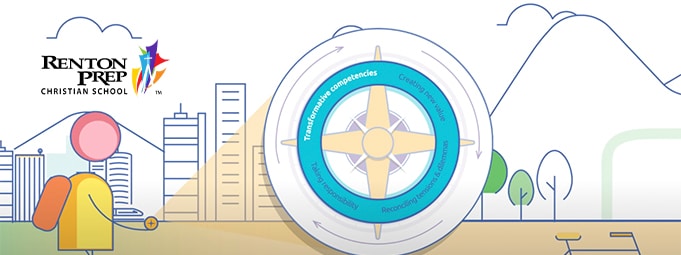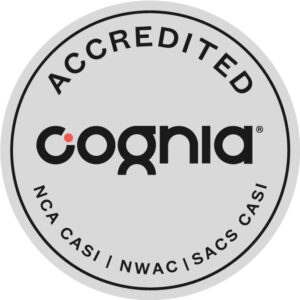
Renton Prep is consistently aiming to optimize and innovate our curriculum design to prepare students for the future. To contribute to the global discussion in education, Renton Prep was invited to participate in the international OECD Future of Education and Skills 2030 forum.
Three Renton Prep eighth graders talked during the OECD global forum to discuss ways Renton Prep has helped students prepare for their future.
Students from over 150 schools from around the world were part of the forum. The three eight graders who participated were Ayaka Pier, Brooklyn Jones, and Sophia Sta. Rosa. They were the only eighth graders amongst 11th graders, 12th graders, and college students.
“People were really accepting of our opinions and ideas,” Pier said. “I think that my cause was really important, and I just kept thinking about that as I went along.”
Each year, the Future of Education and Skills 2030 project is hosted in a different country. Because of COVID-19, this year it was entirely online to avoid gathering in person.
The global forum aims to answer critical questions about the future of education and skill-acquisition in the classroom.
“How can we prepare students for jobs that have not yet been created, to tackle societal challenges that we can’t yet imagine, and to use technologies that have not yet been invented? How can we equip them to thrive in an interconnected world where they need to understand and appreciate different perspectives and world views, interact respectfully with others, and take responsible action towards sustainability and collective well-being?”
By sharing and absorbing ideas from around the world, Renton Prep can adapt to address the long-term challenges facing education. Of course, this year, a large focus was remote learning due to COVID-19. Thought leaders, experts, school leaders, and teachers from around the world met to contribute to the conversation of how to move forward and continue to equip students for future success.
Pier spoke during the plenary address on May 19. Rather than participating in Russia, the event was held virtually over Zoom. She outlined the success Renton Prep has had in transitioning to remote learning. She also discussed the difficulties of distance learning as a student.
“Despite what the teachers have been doing, we are falling behind a little bit in traditional learning,” Pier said during the forum. “But this could also be a good thing — the remote learning — because it teaches us how to adapt to unexpected circumstances.”
By connecting students and teachers for one-on-one meetings through Microsoft Teams, students have been able to stay connected. Despite this, there have been no in-person meetings and no field trips. The dance program, an annual example of how Renton Prep uses differentiated styles of learning, had to be canceled as well.
Thus, students aren’t getting the same experiential learning they usually get in a normal school year. While Pier says Renton Prep was prepared for the transition with technology, the experience just isn’t quite the same.
“There’s a lot of things we can’t do. We really like to go to the museums and theaters and field trips to places,” Pier said during OECD global forum. “Experiential learning has always been a big element of the way our school functions, and not getting to the hands-on part is a big disappointment.”
While it’s not quite the same, technology has allowed us to keep our students connected. Access to these technologies and quality wi-fi for video streaming is critical for online interactions.
“If everyone had the access to technology and was able to communicate with their teacher or their friends, it would really help motivation levels and how people are in general during this specific time,” Pier said.
Renton Prep has consistently put an emphasis on student well-being. A school is not only a place to get an education. It should be a place where students develop social skills and emotional connections with each other.
But checking in on our students and how they’re feeling has changed in a virtual learning experience.
Sta. Rosa shared her experience in a small group session during the OECD Education 2030 global forum.
“I really miss interacting with people day to day,” Sta. Rosa said. “Talking with teachers helps to cement my understanding of the content. Not only that, but there’s a benefit that comes from joking around in the classroom that you just can’t get on your own.”
More than ever, this time has reinforced that education does not have to limit itself to lectures and exams. It’s absolutely critical to the future of education to encourage social and emotional connections with one another.
With a classroom that encourages these connections, students develop individuality, growth, and collaboration skills. During the pandemic, this type of classroom has been used to keep tabs on student’s well-being.
“We’re trying to be here for each other and we’re trying to as much as we can through our screens,” Pier said. “Going forward, we have to come back knowing how everyone is. This has proven to me personally that we should always be checking in with each other.”
The students and teachers of today will help us create the best curriculum and student experiences in the future. Incorporating education ideas from around the globe can help us continually improve student futures.
At Renton Prep, we want our education to equip students with the knowledge, skills, attitudes, and values to thrive in the world in 2030. At the OECD Future of Education and Skills 2030, we were able to exchange ideas and learn from best practices, and contribute to the global education ecosystem.
To learn more about our school and our approach, and how we’re developing students that will go on to be leaders in 2030, contact us today.

